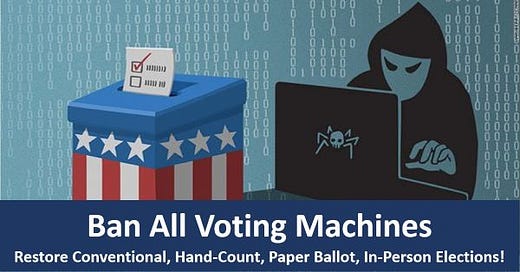Voting Machines Unconstitutional?
Constitutionality Under Fire in Georgia-Trial Could Spark Nationwide Voting Machine Ban!
Federal Judge's Ruling on Georgia's Dominion Voting Machines Sparks Election Integrity Debate
In a legal saga spanning six years, a federal judge in Atlanta is poised to deliver a crucial ruling on the vulnerability of Georgia's Dominion voting machines to hacking and whether their usage violates voters' constitutional rights. The outcome carries significant implications for the state's election procedures as the 2024 presidential campaign looms, injecting fresh uncertainty into the battleground state and fueling debates over election integrity. If this judge rules with the plaintiff and determines the Dominion voting machines violate Georgia’s Constitutional Law, this case with serve to have significant implications nationwide.
Plaintiffs contend that the Dominion system poses a significant burden on voters and presents easy opportunities for fraud. The controversy revolves around concerns about the security of the paperless system and the utilization of ballot-marking devices. In a courtroom demonstration, cybersecurity expert J. Alex Halderman executed a machine hack in under 5 minutes, overriding machine coding and swapping votes. This vividly illustrates the vulnerability of electronic voting systems, including Dominion, to virtually undetectable election tampering. Importantly, during this test, observers were only aware of tampering because it was disclosed to them. On election day, malicious actors, whether in person or remotely, could potentially hack into these voting systems and alter election outcomes without detection—an issue that demands immediate attention and resolution.
For far too long, the public has filed complaints and lawsuits when the election results seem extraordinarily inconsistent with polling or historic outcomes, yet they are burdened with providing evidence that is impossible to obtain because the suspected fraud can be committed without detection.
36 Million Stolen Votes in 2020 Completely Undetectable?! The Left, our government, and the media have been telling us that only 0.0002% of mail-in ballot votes cast are fraudulent based on actual legal cases in which bad actors were found guilty. Recent polling demonstrates that election fraud is widespread with 20% of voters admitting to committing election fraud right under our noses without detection!
A Germany Case Study. In a notable case study, Germany introduced its first electronic voting machines in Cologne in 1998, with nearly 2 million (3%) German voters using the technology by the 2005 general election. The machines were initially praised for their user-friendly interface, leading to a reduction in the number of polling stations and staff, echoing efficiency concerns seen in contemporary systems. However, after the 2005 election, two voters raised constitutional concerns, arguing that the machines were susceptible to hacking, casting doubt on the election results.
This challenge led to a landmark decision by the German Constitutional Court ruling voting machines are unconstitutional. The court emphasized the constitutional requirement for elections to be public and declared that essential steps in the election process must be subject to public scrutiny. It noted that the use of voting machines should only be considered constitutional if the essential steps of voting and result ascertainment can be examined reliably without specialized knowledge. The court highlighted the potential wide-reaching effects of errors or deliberate fraud, necessitating special precautions to uphold the principle of the public nature of elections.
This significant ruling underscored the importance of transparency in the electoral process and concluded that electronic voting, without the ability for public scrutiny and understanding, did not meet constitutional requirements.
As this Georgia federal judge prepares to deliver the verdict, the case underscores the growing national debate over election security and the imperative of transparent, reliable voting processes.
IN 2020, 28 states used Dominion machines to tabulate their votes including most swing states.
In 2018, Dominion was acquired by its management and Staple Street Capital, a private equity firm that also owns Premier Election Solutions (formerly Diebold Election Systems, Inc.) and Sequoia Voting Systems.
Dominion was the second-largest seller of voting machines and was used by 70 million voters in 2016.
On October 26, 2021, during a local election in Williamson County, Tennessee, a Dominion voting machine anomaly was reported to the U.S. Election Assistance Commission (EAC) by the State of Tennessee. The EAC investigated and identified a coding issue. Dominion implemented a fix based on the EAC's findings. A nationwide alert was issued to all states, notifying them of the required updates. However, public confirmation of the completion of these updates before the Mid-term elections is largely unavailable. The EAC's report on this incident was released on April 1, 2022.
Secure Our Elections! Given the widespread lack of transparency, absence of neutral third-party audits, and the unavailability of publicly displayed open-source election processes in our current election systems nationwide, the most viable solution is to reinstate conventional hand-count, paper ballot, in-person, voter-ID, one-day elections.
For all Election Security Campaigns, click HERE







No Voting Machines that hook up to the internet. No drop boxes.